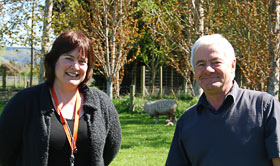

Laurel Quirke and Dr Peter Hurst
Links between the University of Otago and AgResearch enabled through the Centre for Reproduction and Genomics are benefiting leading science programmes and fast-tracking promising science careers.
Improving sheep survival rates has long been a major focus of AgResearch's Animal Productivity group at Invermay. MSc student Laurel Quirke has already made a huge contribution to this team's work during her 17 years working for the company as a research technician. Now her postgraduate studies are not just moving this goal forward, but is also contributing to the University's highly esteemed research output.
Focusing on the earliest stages of the sheep life cycle, Laurel is currently investigating a gene that may contribute to embryo survival in one of their research flocks. From looking at patterns of ovulation and lambing in this flock over the course of many years, AgResearch scientists have developed a picture of which lineages provide the best outcomes, Laurel says.
“There are many phases throughout the development of the embryo that can impact on its health and determine whether or not it will survive. The implantation stage is one in particular that we'd like to know more about.”
Dr Jenny Juengel, one of Laurel's thesis supervisors, along with other scientists in the Animal Productivity group are studying other research flocks that show differences in embryo survival. Together, these studies will produce robust information that will ultimately enable farmers to breed for high pregnancy success rates.
Laurel says that her decision to study towards a Masters was mostly driven by the work she has undertaken over the years, and is a natural career progression. She initially started in the 1990s in molecular biology before moving into working with animals, and has coordinated trials as well as having spent a great deal of time in the lab.
Reproductive biology has always been her main focus, and she hopes her current and future efforts will have a very positive impact on the productivity of New Zealand farms.
Co-supervisor Dr Peter Hurst of the University of Otago's Anatomy department says that joint postgraduate projects between the two institutes produce countless benefits. With the award of an MSc or PhD, the student gains peer-recognition of their scientific ability and credibility and this is often recognised by an employer.
“In my experience, postgraduate students have consolidated collaboration between individuals and research teams at both campuses, and in most cases have added significantly to the scientific excellence and productivity of both parties.”
Developing opportunities to collaborate with AgResearch in this way is testament to the leading research it produces, as the Anatomy department is careful to uphold a high international standard, he says.
